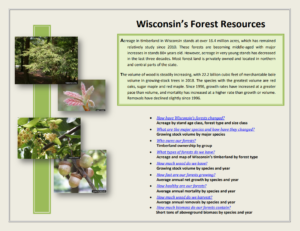In June 2020, the Wisconsin DNR Forest Products Services program hosted two webinars related to forest products utilization and the sustainability of Wisconsin wood products. Overall, these webinars were targeted to educate attendees on Wisconsin’s forest products industry and the benefits of using wood and were aimed at promoting new and emerging technologies and products.
The first webinar – “Wood: Sustainably Grown, Locally Available” – was hosted on June 16. The primary objective of this webinar was to promote the diverse application of Wisconsin’s oldest grown, locally available, and environmentally friendly material – wood. Architects, designers, consumers, and other interested individuals participated in the webinar.
The second webinar was held on June 24 and was titled, “Biochar Production Technologies.” During the webinar, speakers provided information on biochar production systems and technological solutions that can help manage wood residue issues in storm-damaged areas, municipal wood yards, and at wood-manufacturing facilities, while also generating value-added biochar. The webinar expanded on previous outreach, which highlighted the basics of biochar and its potential applications in Wisconsin.
To view recordings of these webinars, visit https://dnr.wi.gov/topic/ForestManagement/videos.asp and select “Forest products utilization and marketing” from the drop-down menu.

